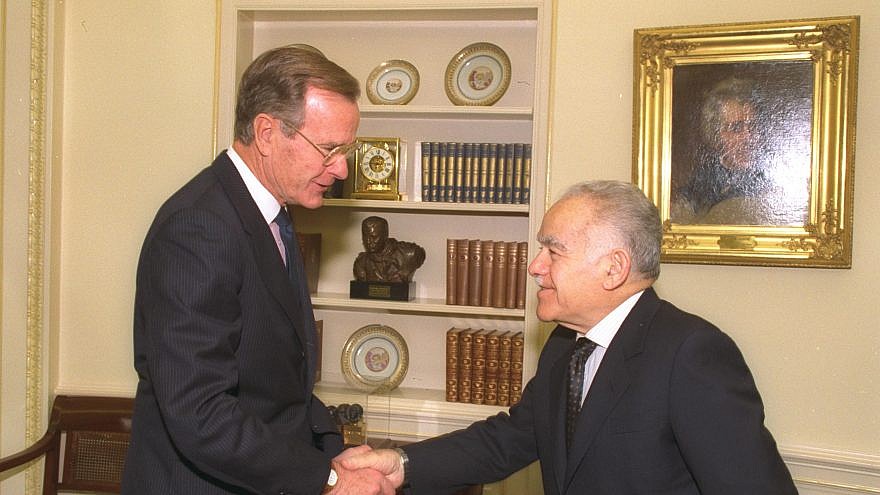Following the death of President George H.W. Bush on Nov. 30, Israeli Prime Minister Benjamin Netanyahu hailed the 41st American president for his “commitment to Israel’s security, important contribution to the liberation of Soviet Jewry and efforts to achieve peace in the Middle East at the Madrid Conference.” Netanyahu served as Deputy Foreign Minister in the four years Bush was president.
Laudatory words have been coming from all parts of the globe for the longest-living U.S. president to date, who had a career that ranged the gamut—from military service to the private sector to longtime government service.
Shamir served two terms, from 1983-84 and 1986-1992—the second of which involved interactions with Bush.
Former Shamir spokesman Avi Pazner told JNS, “The relationship between Bush and Shamir was always quite tense, especially on the issue of Israeli settlements. Bush insisted that new settlement activity be halted. Shamir was generally noncommittal in response, and tensions remained for the entire time they were both in office.”
During the first Gulf war, Bush excluded Israel from the 35-nation coalition against Iraq. But the point was made clear: Israel was expected to absorb rocket fire from Iraq without retaliating.
Pazner said “immediately after the war, Bush and his Secretary of State James Baker began pushing for an international Middle East peace conference. There was always heavy pressure. This became so intense that after U.S. presidential elections in 1992, Shamir expressed satisfaction that Bill Clinton had defeated Bush.”
Former Shamir adviser Yossi Ahimeir told JNS that “before and during the [1991] Gulf War, the two leaders spoke several times a day. Bush insisted that Israel not respond to Scuds from Iraq, and Shamir also insisting that the U.S. must quickly bring a halt to the rocket fire or Israel will retaliate.”
“Bush thought he would be able to impose his demands on Shamir, but it didn’t work,” said Ahimeir. “Shamir long resisted the international peace conference because he viewed it as a kind of tribunal where Israel would effectively be on trial in a world court. Bush was basically an ‘Arabist’ who never gave up pressuring [Israel] to impose his will.
“I think he realized it could not work on Shamir,” said Ahimeir.
Israel and the U.S. relationship with the Arab world
Bush’s post-war focus turned quickly towards halting new settlement activity and launching an international Middle East conference that eventually resulted in the Madrid Conference.
Yossi Ben Aharon, the former director general of the Prime Minister’s Office under Shamir told JNS, “Bush made a constant push for a wide international Middle East conference and a halt to settlements. It soured relations. There were a string of bitter messages from Washington to Jerusalem, mostly on the settlement issue. Shamir exasperated Bush, repeatedly telling him, ‘We take Washington’s positions into consideration,’ while continuing with building settlements.”
Ultimately, Shamir was pressured into attending the Madrid Conference in 1991.
Former Israeli officials credit Bush for his role in securing the rights of Soviet Jews to immigrate to Israel, dating back to his service as U.S. Ambassador to the United Nations beginning in 1971. At the same time, they point out that as president, Bush used the immigration issue as a bargaining chip to gain a halt in settlement activity.
The issue reached its deepest crisis when Bush said in a speech to the nation, “A thousand Jewish lobbyists on Capitol Hill against little old me,” sparking accusations of anti-Semitism. Bush was accused by critics with invoking the charge of “dual loyalty” against U.S. Jews. AIPAC executive director Tom Dine at the time described Bush’s speech as “a day that will live in infamy.”
Ahimeir explained that “President Bush’s decision to block U.S. loan guarantees that Israel needed to settle Soviet Jews in the country was entirely due to his anger over Israeli settlement policy. I remember escorting Shamir on a visit to the White House, and loan guarantees were on the agenda. Bush started the talks by claiming that ‘even while visiting the White House, the prime minister was building a new settlement.’ For the next 30 minutes, the two leaders argued about the Gaza settlement of Dugit in Gaza, with Shamir insisting it was not new, but simply expanded.”
Ahimeir added, “There was always pressure on settlements, but in the end, I think Bush came to understand what was and was not possible with Shamir.”
Former Defense Minister Moshe Arens said that Bush’s worldview “included his feeling that Israel was interfering in the important U.S. relationship with the Arab world.”
Arens told JNS that Bush “opposed Israeli operations in Lebanon and sidelined us from defending ourselves during the Gulf War.”
Leading Israeli analyst on U.S.-Israel relations Professor Shmuel Sandler from Bar-Ilan University in Ramat Gan told JNS that Bush and Shamir were at odds because of the president’s preconceived notions about the Arab-Israel issue. “Bush was convinced that he had great understanding on the issues,” said Sandler. “His views include buying into the Arab world’s emphasis on solving the Palestinian problem as a necessary precursor to solve the Arab-Israel conflict.”
Dr. Gerald Steinberg, president of NGO Monitor and a professor of political studies from Bar-Ilan University, describes Bush’s relationship towards Israel as having been, “problematic, aloof and waspish. There was no warmth or personal connection.”
According to Steinberg, “Bush viewed Israel as a strategic asset. At the same time, he was very close to the Saudi regime and other Arab oil powers. He was extremely frustrated by failed efforts to advance the peace process and placed the blame on Israel.”
Steinberg recalled an exasperating moment when Secretary Baker issued a statement to Shamir, saying, “Call us when you want peace. Here is the phone number … ”


























